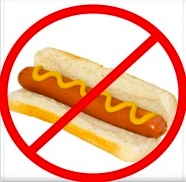Labelling Dangerous Foods (for Kids)
 In a blog posting a few months ago, I asked “Are Hotdogs Unreasonably Dangerous?” Some commentators suggested that the overriding concern with hotdogs ought to be their (lack of) nutritional value; but the immediate worry discussed in that blog posting was actually the choking hazard hotdogs pose for kids. And the question I posed was whether makers of hotdogs are in any sense responsible for deaths due to choking.
In a blog posting a few months ago, I asked “Are Hotdogs Unreasonably Dangerous?” Some commentators suggested that the overriding concern with hotdogs ought to be their (lack of) nutritional value; but the immediate worry discussed in that blog posting was actually the choking hazard hotdogs pose for kids. And the question I posed was whether makers of hotdogs are in any sense responsible for deaths due to choking.
Here’s an update, based on a new story by Laurie Tarkan in yesterday’s New York Times: Labels Urged for Food That Can Choke.
This time, the issue is labelling. Here’s the bit I found interesting:
Some food manufacturers have voluntarily put warning labels on packages. “Two-thirds of hot dogs already have labels,” said Ms. Riley, of the National Hot Dog and Sausage Council. But Mr. Silverglade [legal director of the Center for Science in the Public Interest] said that was not enough….
What’s the weight of that statistic, in terms of how it should guide corporate behaviour? In an academic paper I co-wrote on the labelling of genetically-modified foods, I argued that consensus within an industry matters. When people’s safety is at stake, the fact that government hasn’t passed a law requiring companies to take action doesn’t mean those companies have no obligation to act.
When most companies in an industry think “this is how we ought to do business,” that means something. First, it means that people who know a given product best see a need for action. Also, when an entire industry gets behind a particular standard, that means that companies remain on a level playing field. Changing how you manufacture or label your product might otherwise put you at a competitive disadvantage. But when two-thirds of your industry is implementing the same standard, that argument pretty much falls apart.


It’s an interesting question. On one hand, I grew up with a Ball Park Frank at every summer ball game, BBQ, and family outing without choking. Parental responsibility must be accounted for to some degree. Don’t run with food in your mouth, and if children are too young to hold a knife without supervision, parents should probably pay attention and cut food into pieces. I know it’s all about corporate responsibility, but what wont a kid choke on anymore? On the other hand, maybe…somehow…the risk of choking isn’t blatantly obvious. How many adults have choked to death from eating a hot dog? If both were, then sure I’d say it’s apparent there’s a need for safety warnings. However, the hot dog companies don’t market to just children…but it’s children choking so I ask, where’s Mom and Dad?
I think that similar to the recent laws on menu labeling of calories and fat content at restaurants…it’s becoming ridiculous how people can’t take responsibility anymore. At a certain point, we have to stop and evaluate what the absence of accountability is doing to everyone. Or, maybe not.
Megan:
Check out the original NYT story. It talks about the extent to which parental responsibility is enough. Basically, unfortunately NO degree of parental supervision is enough to prevent choking if the food is a choking hazard.
Chris.
I agree with the argument you present here, though I think we have to consider that it is possible (I would say likely) that what’s led part of the hot dog industry to label its products “dangerous” is not an ethical motivation, but a legal one. Maybe adding a “use this product under your own risk” label somewhere on products is enough to withdraw elements for those parents whose kid choked on x to get away with a successful lawsuit against the company.
I read today this blogpost on food choking statistics – http://divisionoflabour.com/archives/007152.php . If food will cause .0000002 emergency room worthy chokings (per kid meal), and 160 deaths among children in the US, isn’t it a bit inconsistent to require hot dogs to state their “danger” when cars are sold without warnings (and kill a much higher number of people), or when other types of more calorie and fat-dense foods that are more likely to make a kid diabetic or die early will not have the same stigma associated with them?
I guess there is room for arguing whether it is fine to attempt to drive people away from junk food in general by making it seem undesirable, no matter the means, but that doesn’t cover why it’s just hot dogs and not Twinkies, too. (Sorry if Twinkies have been declared dangerous, too, though!)
[…] Chris MacDonald Discusses Food Labeling Filed under: Teaching,business ethics — southwerk @ 7:14 am Tags: Chris MacDonald, hot dog Chris MacDonald discusses the Business Ethics of the lowly hot dog. […]
[…] Rather than repeat what I’ve said before, I’ll just point you to these 2 previous blog entries of mine: Are Hotdogs Unreasonably Dangerous? and Labelling Dangerous Foods (for Kids) […]